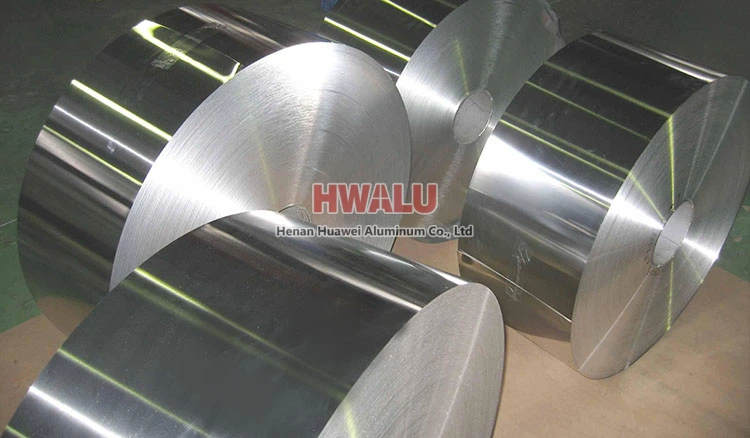What is Thin Aluminum Foil? Thin aluminum foil is a very thin aluminum material, usually between 0.006mm and 0.2mm. Thin aluminum foil can be manufactured through a process of rolling and stretching, which allows it to be very thin without sacrificing strength and durability. It also has some other advantages such as high electrical conductivity, thermal insulation, corrosion resistance, easy cleaning, etc. ...
Introduction of 8011 alloy aluminum foil 8011 alloy aluminum foil is added Al-Fe-Si elements, more than 1% of the total alloying elements in the corresponding performance of its alloy has a higher advantage, mainly for food packaging, and pharmaceutical packaging. Machinable range of thickness: 0.02mm-0.07mm, width 300mm-1100mm, can be customized according to customer needs. General parameters of aluminu ...
Aluminum foil alloys for food container lids Pure aluminum is a soft, light, and easy-to-process metal material with good corrosion resistance and thermal conductivity. It is often used to make the inner layer of food container lids to protect the freshness of food and prevent external contamination. In addition to pure aluminum, commonly used aluminum alloys include aluminum-silicon alloys, aluminum-magnesiu ...
Introduction of 8006 alloy aluminum foil 8006 alloy aluminum foil is a non-heat treatable aluminum alloy. The 8006 aluminum foil product has a bright surface and is degreasing clean. Especially suitable for making wrinkle-free lunch boxes. Huawei Aluminum's 8006 aluminum foil adopts hot rolling method, and the tensile strength is between 123-135Mpa. Technical parameters of aluminum foil 8006 Alloy 8 ...
Can aluminum foil be used in food containers? Aluminum foil, as a metal material, is commonly used in the manufacture of food containers. Aluminum foil containers are a popular choice for packaging and storing all types of food due to their lightweight, corrosion resistance and thermal conductivity properties. Has many characteristics. 1. Aluminum foil container has corrosion resistance: the surface of alumin ...
The performance differences between 3003 aluminum foil and aluminum plate are primarily related to its physical and mechanical properties and its intended application. Here are some of the main differences in performance: Formability: 3003 Aluminum Foil: 3003 aluminum foil is highly formable and can be bent, formed and folded easily. It is often used in applications that require flexibility and ease of mold ...
The selection principle of pass processing rate is as follows: (1) Under the premise that the equipment capacity allows the rolling oil to have good lubrication and cooling performance, and can obtain good surface quality and shape quality, the plasticity of the rolled metal should be fully utilized, and the large pass processing rate should be used as much as possible to improve the rolling mill Production ef ...
Aluminum foil factories will pay special attention to the following details when processing aluminum foil: Cleaning: Aluminum foil is very sensitive to impurities, any dust, oil or other contaminants will affect the quality and performance of the aluminum foil. Therefore, before processing aluminum foil, the production workshop, equipment and tools must be thoroughly cleaned to ensure that there is no contamin ...
Food packaging aluminum foil is related to human health and safety, and is usually produced with specific specifications and characteristics to ensure its suitability for the food industry. The following are some common specifications of aluminum foil for food packaging: Food packaging foil alloy types: Aluminum foil used for food packaging is usually made from 1xxx, 3xxx or 8xxx series alloys. Common alloys in ...
Aluminum foil is often colloquially referred to as "tin foil" due to historical reasons and similarities in appearance between the two materials. However, it's important to note that aluminum foil and tin foil are not the same thing. Here's why aluminum foil is sometimes called "tin foil": Historical Context: The term "tin foil" originated at a time when actual tin was used to create thin sheets for wrappin ...
Now the aluminum foil we see in the market is no longer made of tin, because it is more expensive and less durable than aluminum. The original tin foil (also known as tin foil) is really made of tin. Tin foil is softer than aluminum foil. It will smell tinted to wrap food. At the same time, tin foil cannot be heated due to its low melting point, or the heating temperature is high-such as 160 It begins to becom ...









